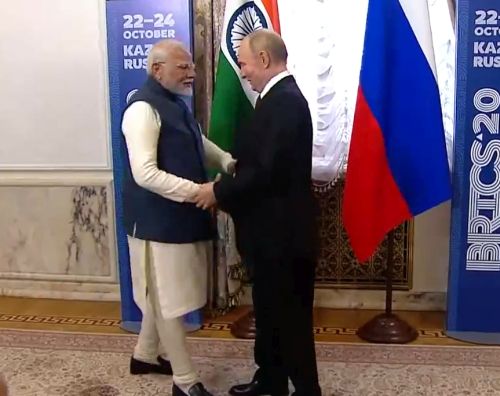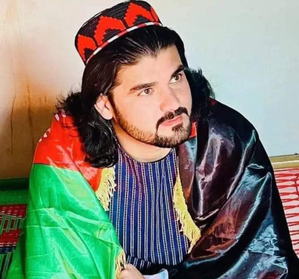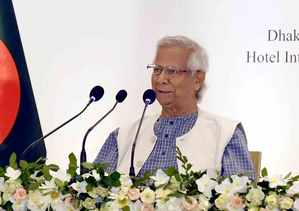International
Murder of a poet: Gilaman Wazir versus the Deep State of Pakistan (IANS Analysis)
New Delhi: On July 12, Pakistan witnessed a profound display of unity, sorrow, and ethnic identity as thousands gathered to honour a poet. From Islamabad to his native graveyard in Asadkhel, North Waziristan, people, especially Pashtuns, flocked to view the casket of the revered Pashtun poet and activist Gilaman Wazir.
A prominent member of the Pashtun Tahafuz Movement, Wazir was fatally attacked on July 7 in Islamabad, an assault suspected to be orchestrated by Pakistani security agencies. This tragic event is not an isolated incident but rather a continuation of a disturbing pattern where Pashtun dissent is suppressed, their leaders or activists targeted, and their entire community subjected to intensified security measures.
Growing up near the Durand Line in North Waziristan, which was part of the Federally Administered Tribal Areas (FATA) until 2018, the 30-year-old endured a life deeply affected by terrorism from both state and non-state actors, severe economic hardship, and frequent displacements. This region, formerly known as FATA, has witnessed numerous cycles of violence and oppression, driven by complex regional and global geopolitical dynamics.
Gilaman Wazir (officially known as Hazrat Naeem) became a thorn in the side of Pakistani authorities when he engaged in digital activism for Pashtun rights from Bahrain, where he worked as a labourer. He supported the emerging Pashtun Tahafuz Movement (PTM), a peaceful group demanding military accountability for its excesses and the restoration of Pashtun democratic rights and civil liberties.
In 2020, at Pakistan’s request, Bahrain jailed him and then deported him, with Pakistani authorities subsequently seizing his passport. Once back home, Wazir intensified his PTM activism, participating in protests, reciting poetry, and mobilizing the Pashtun community. His social media presence was influential, where he criticized the Taliban and the Pakistani state.
He fervently advocated for Pashtun women’s rights, emphasised the shared identity of Pashtuns across the border, and expressed his admiration for the Afghan national flag. It is not surprising that the Pakistani regime, known for its aversion to ethnic identity-based movements, repeatedly imprisoned him, with the most recent detention spanning from July 2023 to February 2024.
PTM leader Manzoor Pashteen, addressing the mourners, revealed, “He was bitten by dogs and subjected to electric shocks”.
Wazir is not the first PTM leader to suffer torture or death at the hands of the Pakistani establishment.
In 2019, PTM member and Pashto literature professor Arman Loni was taken from a sit-in and was reportedly killed by the police, who attributed his death to a heart attack.
The following year, PTM leader Arif Wazir was shot by unidentified assailants, just four days after being released on bail for an allegedly ‘anti-national’ speech.
The PTM originated in 2018 from its predecessor, the Mehsud Tahafuz Movement (MTM), a peaceful grassroots initiative led by internally displaced university students. This movement called for fair investigations into enforced disappearances, targeted killings, land demining, and the removal of surveillance measures like security checkpoints, as well as an end to systemic discrimination.
Initially formed to protest the police killing of Naqeebullah Mehsud, who was accused of Taliban links, the MTM soon broadened its focus to include all Pashtun communities, who had collectively endured similar terror and repression.
While the roots of the Pashtuns’ troubles can be traced back to colonial-era occupations and artificially drawn national borders, the current conflict largely ignited with the US invasion of Afghanistan.
Following this event, the Taliban fighters sought refuge in the region, not only to escape but also to continue their operations. Consequently, the civilian population found itself caught in the crossfire. The Taliban, on one hand, radicalized and recruited youth, targeted community elders who opposed them, and engaged in extortion and executions.
On the other hand, the US and Pakistani state responded with indiscriminate bombings, drone strikes, and extensive military operations, wreaking havoc on local lives and livelihoods.
This backdrop explains why Pashtun communities are protesting the latest Pakistani military campaign, ‘Operation Azm-e-Istehkam’.
Additionally, the region formerly known as FATA had suffered under repressive state mechanisms, exemplified by the British-era Frontier Crimes Regulation (FCR) that enforced collective punishment. While the FCR was abolished in Khyber Pakhtunkhwa in 1956 and Balochistan in 1973, it remained in effect in FATA until 2018, when FATA was finally integrated into Khyber Pakhtunkhwa.
The PTM draws inspiration and tactics from Bacha Khan (Khan Abdul Gaffar Khan) and his ‘Red Shirt Movement’, as well as Khan Shaheed (Abdul Samad Khan Achakzai), a Pashtun nationalist from present-day Balochistan who led a non-violent civil disobedience campaign against British rule.
Primarily led by students, lawyers, political and human rights activists, and professors, the PTM is driven by a commitment to constitutional democracy and local traditions, despite state attempts to label it as separatist and ‘foreign-funded’.
In 2018, PTM leaders Mohsin Dawar and Ali Wazir were elected to Pakistan’s National Assembly, the lower house of Parliament. A key demand of the PTM is the creation of impartial truth and reconciliation commissions to investigate human rights abuses that occurred during Pakistani military operations in Pashtun areas.
The Pakistani state perceives the PTM as a significant threat due to its scrutiny of the army’s actions and its advocacy for Pashtun unity, which challenges the state’s foundational narrative of a monolithic Islamic identity. The movement is frequently accused of receiving support from adversarial countries like India and Afghanistan, and its leaders are often arrested and tortured on charges of sedition.
At times, Pakistani forces, either directly or through intermediaries like the Taliban-defector-led ‘Peace Committees’ or ‘unidentified assailants’, employ violence to suppress the PTM.
The assassination of Gilaman Wazir seems to exemplify and perpetuate this strategy, which has claimed several other lives before him. The media, under military directives, is instructed to ignore PTM protests and minimise coverage of their leaders.
This was evident when the media overlooked Wazir’s funeral, despite it being attended by tens of thousands. Nonetheless, the full force of the Pakistani state failed to deter a long-suffering populace from gathering to honour their slain poet, waving Afghan flags and chanting, ‘ye jo dehshatgardi hai, iske peechhe wardi hai’ (those in uniform are behind this terrorism).
–IANS
as/arm
International
Lee Hsien Yang seeks refuge in United Kingdom

Lee Hsien Yang, the youngest son of Singapore’s founding father, the late Lee Kuan Yew, announced on Tuesday that he is now a political refugee in the United Kingdom after seeking asylum from the British government “as a last resort.”
“I remain a Singapore citizen and hope that someday it will be safe to return home,” Lee stated in a Facebook post, as reported by Channel News Asia (CNA).
Citing what he described as the Singapore government’s “attacks” against him, Lee, who is the younger brother of former Prime Minister Lee Hsien Loong, revealed that he sought asylum protection in 2022.
Lee Hsien Yang and his late sister, Lee Wei Ling, who passed away earlier this month, have been in conflict with their brother Lee Hsien Loong over the fate of their father’s home following his death in 2015, resulting in a public dispute that has estranged the siblings.
In an interview with the UK-based newspaper The Guardian, Lee alleged that a “campaign of persecution” compelled him to seek asylum in Britain.
In response to his claims, the Singapore government stated that there is “no basis” for his allegations of “a campaign of persecution” or other assertions regarding political repression in the country.
“Singapore’s judiciary is impartial and makes decisions independently. This is why Singaporeans have a high level of trust in the judiciary,” a government spokesperson remarked.
The spokesperson added that there are no legal restrictions preventing Lee and his wife, lawyer Lee Suet Fern, from returning to Singapore. “They are and have always been free to return to Singapore,” the spokesperson said.
Lee and his wife have been outside of Singapore since 2022, having opted not to attend a scheduled police interview regarding potential offenses related to providing false evidence in judicial proceedings concerning their father’s will and the family home.
Lee and his late sister, who had been living at the property, alleged they felt threatened while trying to fulfill their father’s wish to demolish the house. They also accused their elder brother, former Prime Minister Lee Hsien Loong, of abusing his governmental influence to advance his personal agenda.
International
Indo-Russian ties are stronger than ever before at BRICS

Kazan, Russia: Prime Minister Narendra Modi held a bilateral meeting with Russian President Vladimir Putin on the sidelines of the 16th BRICS Summit.
During the meeting, President Putin remarked, “I recall our meeting in July, where we had productive discussions on various issues. We’ve also spoken over the phone several times. I am very grateful you accepted the invitation to come to Kazan. Today, we will attend the BRICS Summit’s opening ceremony, followed by dinner.”
PM Modi responded by expressing his appreciation, saying, “I sincerely thank you for your friendship, warm welcome, and hospitality. It’s a great pleasure to visit such a beautiful city as Kazan for the BRICS Summit. India shares deep historical ties with this city, and the opening of our new embassy here will further strengthen these connections.”
International
Laos seeks to enhance nutrition amid climate change concerns

Vientiane (Laos), Aug 22 (IANS) Representatives from the Lao government and development partners have attended a conference here titled “Climate Change and Nutrition in Laos: Intersections and Interventions” to discuss the impact of climate change on nutrition in the Southeast Asia country and potential solutions.
Speaking at the conference, deputy director general of the Department of Hygiene and Health Promotion under the Lao Ministry of Health Viengkhan Phixay, said, “We gather to address a critical and interwoven issue: the impact of climate change on nutrition and how we can work together to tackle these challenges,” Xinhua news agency reported.
The Lao government is actively engaged in this endeavor, with numerous policies and initiatives aimed at addressing both climate change and nutrition, Lao National Television reported on Thursday.
“By leveraging the Scaling Up Nutrition network in Laos, which is led by the government, and supported by civil society, donors, and the United Nations, we have a robust platform to tackle the negative impacts of climate change while improving nutrition and overall health for everyone in Laos,” Viengkham said at the conference held on Monday.
The conference featured a series of presentations that not only detailed evidence-based research but also introduced innovative tools for measuring and enhancing nutrition under the impact of climate change.
The conference stressed the critical need for integrated approaches to tackle the intertwined challenges of climate change and nutrition, and setting the stage for impactful future collaborations.
–IANS
int/psd
International
One killed, seven injured in shootout in Iraq

Baghdad, Aug 22 (IANS) A civilian was killed while seven others were injured on Thursday in a tribal shootout in Iraq’s holy Shiite province of Najaf, according to a local security source.
The shootout erupted in the early hours between armed men from the local tribe in the al-Zarga area in northern Najaf, some 160 km south of Baghdad, a local police officer told Xinhua on condition of anonymity.
The clash resulted in the killing of an Iraqi civilian and the injury of seven others, including three Iranian Shiite pilgrims, the source added.
A joint force from the Interior Ministry’s emergency response division and Najaf provincial police arrested 53 gunmen from both sides of the shootout and seized weapons and ammunition, the Interior Ministry said in a statement.
It added that search operations are ongoing to locate additional gunmen and weapons, with more details to be released later.
The incident took place as numerous pilgrims traveled to the city of Karbala to observe Arbaeen, which marks the end of a 40-day mourning period for the killing of Imam Hussein, the grandson of Prophet Muhammad, in the Battle of Karbala in 680 A.D.
Typically, these pilgrims also visit Najaf as part of their journey to Karbala.
–IANS
int/jk/arm
International
Bangladesh seeks $1 billion budget support from World Bank

Dhaka, Aug 22 (IANS) Bangladesh’s interim government has sought $1 billion from the World Bank as budgetary support.
The call came from the country’s Power, Energy and Mineral Resources Adviser Muhammad Fouzul Kabir Khan’s meeting with Abdoulaye Seck, the World Bank’s Country Director for Bangladesh and Bhutan, in Dhaka on Wednesday.
He made the plea as the ministry owes more than 2 billion dollars to suppliers in import costs of power and energy, Xinhua news agency reported.
Khan mentioned that the interim government, which was formed with many pressing mandates, is due to settle a $2 billion debt left by the previous government in the power sector.
He said they have already suspended activities under the much-criticized Quick Enhancement of Electricity and Energy Supply Act 2010 and abolished the government’s power to set energy prices without any public hearing.
On August 5, the former Prime Minister of Bangladesh, Sheikh Hasina, was ousted from her country and power, ending her rule since January 2009.
This event was seen as a massive escalation, with what initially started as student’s protests and resulted in a major crisis in Bangladesh.
Earlier on August 8, Nobel laureate Muhammad Yunus took oath as the head of Bangladesh’s interim government.
–IANS
int/jk/as
-
Video2 years ago
PM Modi Attacks Congress in Karnataka with “Kerala Story”
-
Politics2 years ago
Siddaramaiah & DK Shivakumar sworn in as Chief Minister & Deputy CM respectively
-
Cricket2 years ago
CSK players rejoice 5th IPL title with their families (Pics)
-
Entertainment2 years ago
Karan Deol weds his longtime Girlfriend Drisha Acharya (Pics)
-
Sports7 years ago
History Of Official FIFA WORLD CUP Match balls
-
India2 years ago
Ashwini Vaishnaw: Railway Board recommends CBI probe in the Odisha railway disaster
-
Entertainment2 years ago
Urvashi Rautela dazzles on Cannes 2023 red carpet (Pics)
-
Entertainment2 years ago
Sunny Leone gets ready for Kennedy premiere in Cannes (Pics)






























